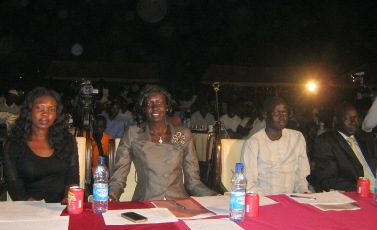Era of marginalization over, SPLM youth leader tells southerners
November 7, 2010 (JUBA) – The days when South Sudanese were highly marginalized and often referred to as “second class citizens incapable of [making] decisions” should be put aside and instead focus made on the January 2011 referenda, a senior member of the Sudan People’s Liberation Movement (SPLM) youth league said on Saturday.

Paul Akol, the leader of the SPLM youth league made the remarks while addressing over a thousand people who witnessed the preliminaries of this year’s Miss Malaika new Sudan beauty pageant.
According to SPLM youth leader, the whole concept of new Sudan adopted as part of the Miss Malaika event, should be viewed as an important milestone in preparations for the long-awaited referendum for self determination of southerners as well as that on the fate Abyei.
“Let’s not forget the fact that we have been marginalized for so long. Let’s also not forget the fact that many have for long associated us with being second class citizens. It’s now time for us to decide the destiny of this region,” Akol told the large gathering amidst chants.
The annual event, organized by Southern Sudan Artists Association (SSAA) attracted 22 contestants, but only 14 of them, judged on the basis of confidence, originality, communication skills and traditional attributes, qualified for the finals due on December 04.
He further challenged the contestants to play leading roles in championing the girl-child education policy, civic education and engage in community services, saying these are the pillars for sustainable development.
On his part, however, Both Diu, the Acting Undersecretary in the Ministry of Culture and Heritage, Government of Southern Sudan (GoSS) emphasized the importance of maintaining the various societal cultures, which he said helps in promoting the country’s image.
Diu appealed to the various contestants to strive towards role modeling society and desist from the practices of westernization, saying the western cultural trends appears to be destroying the strong African values.
Previous events have attracted lots of criticisms, with the organizers and judges often in the spotlight. Critics have in the recent past accused of the organizers of lacking transparency, hiring bias judges and allegedly pre-determining the eventual winners prior to the final event.
However, Lam Tungwar, the SSAA’s Chairperson has repeatedly denied these waves of accusations and maintains that there is very high level of transparency in the selection criteria, training of the contestants and determining who takes the crown.
“Our objective is clear. We strive to provide women of African origin with the opportunity to recognize the potential of their beauty and talent, not judged by the western standards and criteria. The whole process is very transparent and fair,” Lam told Sudan Tribune.
The 2010 Miss Malaika beauty contest, which is based on the theme, “bringing youth together and encouraging peace and stability in Sudan in the January 2011 referendum through beauty and fashion,” is being supported by Ayat construction for roads and bridges, Arech Motors and Rhino Stars.
South Sudan is widely expected to vote to become a new nation in the upcoming referendum.
(ST)

Gatwech
Era of marginalization over, SPLM youth leader tells southerners
Dear readers,
Yes, I like the statement by the Chairman of the Southern Sudan Artists Association (SSAA), Mr. Lam Tunguar, when he said “Our objective is clear. We strive to provide women of African origin with the opportunity to recognize the potential of their beauty and talent, not judged by the western standards and criteria. The whole process is very transparent and fair,” Lam told Sudan Tribune.
I hope all those girls from all the ten states of South Sudan will do their utmost to cling to that objective of displaying the African origin.